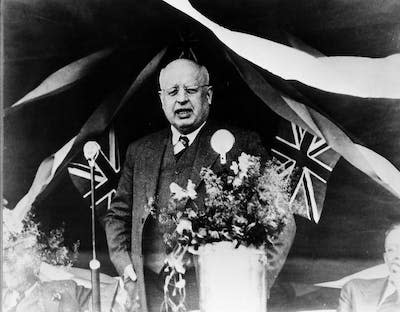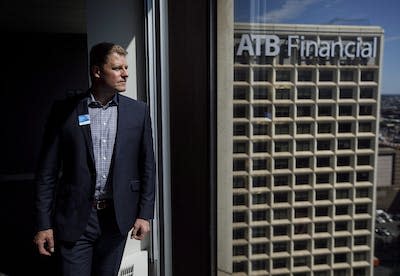Sovereignty Act rollback: Incoming Alberta premier would follow rule of law on bill
Yesterday
EDMONTON — The top adviser to incoming Alberta premier Danielle Smith says her proposed sovereignty act would respect Supreme Court decisions – a reversal of her core policy promise on how she would challenge Prime Minister Justin Trudeau’s government.

Sovereignty Act rollback: Incoming Alberta premier would follow rule of law on bill© Provided by The Canadian Press
Rob Anderson, Smith’s campaign chair for the United Conservative Party leadership and now executive director of her transition team, told CBC in a story published Saturday that Smith’s proposed sovereignty act won’t empower Alberta to disregard Supreme Court rulings.
But Anderson promised that the act, which has yet to be drafted, would “have a whole head of very sharp teeth” and “change the dynamic” with Trudeau’s Liberal government.
Smith’s spokesman Jonah Mozeson, responding to an email request for comment Monday, declined to answer specific queries about Anderson’s statement.
In a short statement, Mozeson said, “As the premier-designate has said, the sovereignty act will be drafted in accordance with sound constitutional principles.
“The premier-designate looks forward to working with caucus to draft legislation that protects and asserts Alberta’s constitutional rights in accordance with the rule of law.”
The sovereignty act is the signature policy for Smith, who is to be sworn in as premier Tuesday.
She won the UCP leadership race last week showcasing the act as a vanguard of a broader paradigm-busting challenge against what she has termed Trudeau’s "lawless" intrusion in areas of provincial scope, ranging from energy development to COVID-19 health rules.
The act as proposed by Smith would allow the province to refuse to follow federal laws and court rulings it deemed to be not in Alberta’s best interests and an illegal intrusion into its duly delegated spheres of influence under the Constitution.
As recently as a month ago, Smith said the sovereignty act would only be used in special circumstances using "special motions" requiring the consent of the legislature.
She also stressed Alberta would not consider itself bound by the courts.
“If a court stays or ultimately deems that the actions undertaken by the province under a specific Alberta sovereignty act special motion is unconstitutional, then the government and legislature will have to review the special motion actions in question and make a decision as to whether or not to amend, end or continue with them, understanding the legal implications such a decision could cause,” Smith said in a news release Sept. 6.
The sovereignty act dominated the debate throughout the summer-long leadership campaign to replace Jason Kenney as party leader and premier.
It was denounced by five of Smith's six leadership rivals, and by Kenney, as a profoundly illegal and dangerous plan doomed to ignite economic chaos as Albertans, investors and businesses wouldn’t know which laws they were to follow.
Alberta Lt.-Gov. Salma Lakhani entered the debate at one point, saying she is duty-bound not to sign into law a bill that violates the Constitution.
Martin Olszynski, an administrative law professor at the University of Calgary, who has written articles on the sovereignty act, said if Anderson’s reversal is as advertised, it is the legally proper way to proceed but represents a fundamental rollback of Smith’s original proposal.
“All of the sovereignty act, as it has been currently described, could only work if the premier and the legislature were prepared to ignore the courts. That’s been very clear. That’s why everybody was so alarmed,” said Olszynski in interview.
“We have to see the details, of course,” he added.
“But if suddenly now the premier-designate and her office are prepared to say, 'of course we're bound by the courts,' then the sovereignty act goes nowhere.”
Smith said the sovereignty act will be introduced in the upcoming fall session.
It grew out of the Free Alberta Strategy, a policy paper introduced last September by Anderson, University of Calgary political science professor Barry Cooper and lawyer Derek From.
In the paper, the trio call for radical action, such as refusing to implement federal laws and court rulings, in order to combat decisions deemed to be mortally wounding Alberta's development.
Cooper, in a June newspaper op-ed, said the unconstitutionality of such a proposal is not a bug in the program but its primary feature.
In a National Post story published June 17, Anderson was quoted saying, “The idea is that it doesn’t matter what the Supreme Court or the federal government says about it, if it attacks Albertans, the interest of Albertans, and it attacks our jurisdictional rights, we simply won’t enforce it with any provincial agency.”
Anderson told the newspaper at that time that he expected the sovereignty act would likely be found unconstitutional but the province could ignore such a court ruling.
“The Alberta legislature would say, ‘Thanks for that, but we’re not going to enforce it. So you can’t make us.' And what are they going to do? Maybe send in the army? Is that the plan?” said Anderson.
This report by The Canadian Press was first published Oct. 10, 2022.
Dean Bennett, The Canadian Press
EDMONTON — Danielle Smith has become Alberta’s new premier.

United Conservative Party Leader Danielle Smith sworn in as Alberta's new premier
Smith was sworn into office by Lt.-Gov. Salma Lakhani in a ceremony at Government House in Edmonton.
Smith will also serve as intergovernmental affairs minister and plans to announce a revised cabinet on Oct. 21.
In her first remarks as premier, the United Conservative Party leader promised to govern on core values of freedom, family, faith, community and free enterprise.
She also promised to challenge the federal carbon tax and to introduce a sovereignty act that would reject federal laws deemed against the province's interests.
The 51-year-old former Wildrose Party leader and journalist doesn't have a seat in the legislature but announced over the weekend that she will run in a byelection in Brooks-Medicine Hat.
That seat became vacant when the constituency's current representative, Michaela Frey, resigned on Friday.
Smith replaces Jason Kenney, who formally handed in his resignation as premier before Tuesday's swearing-in ceremony.
Smith won the UCP leadership race last week to replace Kenney as party leader and premier. Kenney announced he was quitting months earlier following an uninspiring 51 per cent vote of support in a party leadership review.
This report by The Canadian Press was first published Oct. 11, 2022.
Stephen Magusiak | PressProgress | October 8 |
Last week, the United Conservative Party held their election to determine the new leader of their party after Alberta Premier Jason Kenney stepped down following the last leadership election (which he won, but by a margin he felt wasn’t enough). The winner of said race would also become Alberta’s premier. On the sixth ballot, Danielle Smith won with about 53 per cent of the vote, or about 0.9 per cent of the population of Alberta. People across the province are rightfully worried about what’s next. PressProgress has put together an article to explain why. |
David J. Climenhaga | Rabble | October 6 |
And here’s another article on Smith, this one from Rabble. David J. Climenhaga writes, “An advocate of quack COVID cures and disseminator of dangerous pandemic conspiracy theories during her tenure in right-wing talk radio, [Danielle] Smith also plans a quick attack on the leadership and structure of Alberta Health Services. Decentralization will be the buzzword. Privatization will be the goal. Chaos will be the result. Don’t plan on getting sick in Alberta during Smith’s unelected premiership. Pensions, Mounted Police, and public services will all be for the wood chipper too, by the sound of it. This is the program the UCP’s backers had hoped outgoing Premier Jason Kenney would deliver. But for all his flaws, he proved too traditional a politician to fully take that risk.” (3 minute read) |









